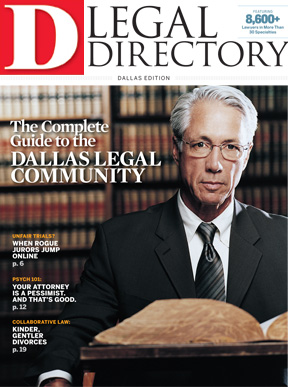Researchers in “positive psychology” tell us that optimism is a great predictor of success. Optimistic athletes perform better than pessimistic athletes. Optimistic salesmen outdo pessimistic salesmen. The best students are those with an optimistic outlook. Name a profession, the research suggests, and you’ll find that the glass-half-fullers come out on top.
There is one glaring exception in the findings: Pessimists seem to make better lawyers. That’s not surprising to Cynthia Pladziewicz, the chief development officer of Dallas-based law firm Thompson & Knight. As she puts it, “No one wants an optimist reviewing their contracts.”
After working for 10 years as a real estate lawyer, Pladziewicz went back to school and spent 10 years in private practice as a clinical psychologist before returning to Thompson & Knight. She confirms what much testing has shown: lawyers are different from the rest of us.
Lawyers tend to be introverted and more likely to take a big-picture approach to a problem. They’re competitive, and more focused on intellectual issues than on emotional concerns. They love to analyze problems and need mentally stimulating work. They don’t need as much interaction with people. They’re also a skeptical lot, which is likely where the pessimism comes in.
But the homogenous group that enrolls in law school—homogenous most especially from a socioeconomic standpoint—can take off in vastly different directions after graduation. Juris doctorates are put to a myriad of uses, in an array of environments. These options can be so different as to raise the question of whether a corporate tax attorney and a criminal prosecutor are even working in the same profession.
So how does a group of five young lawyers—all of whom graduated from Southern Methodist University’s Dedman School of Law within the last several years—end up pursuing vastly different paths while working within a few miles of each other in Dallas? What motivates one to work out million-dollar deals, another to seek compensation for the injured, one to bring families together, one to join a nonprofit, and another to fight crime?
We decided to find out.
Big Business at a Big Firm
Emmanuel Obi, a 30-year-old corporate associate working on mergers and acquisitions in the Dallas office of international firm Weil, Gotshal & Manges, enjoys being at the center of the action. Having earned a bachelor’s degree in finance, the field is a good fit for his interests.
“With every deal, you’re learning about a different industry, different business dynamics. So with every project, I feel that I’m learning something,” he says. “It’s stuff that I’m learning that I had always had an inclination toward.”
Pladziewicz says corporate transactional attorneys like Obi love to solve problems, even more than the “typical” lawyer does.
“They love to really just have a very complex situation with lots of different pieces and try to make them all fit together and try to find a way to make it work when it seems like it won’t,” she says.
Obi is an office-bound lawyer, not a litigator arguing cases in open court. He prefers the somewhat more cooperative environment of transactional law.
“The litigation practice is a lot of times an exercise in a zero-sum type deal, where it’s very adversarial. The level of conflict, whether intentionally or just because of the situation, is very appreciable,” he says. “For me, I’m more of a guy to be like ‘we all want this deal to happen.’ The buyer wants to buy this. The seller wants to sell. So we’re starting off our relationship on a mutual ground. Now all we got to do is work out all the details.”
He likens an attorney working on a financial deal to a football quarterback—someone who has to marshal the efforts of a team of specialists to get the job done.
“For you to be able to take a 100-page agreement and be able to just sit there and just read it, word for word, making sure that all the sections match up, all the concepts are built in, all of your client’s issues are in …” he says. “The deal lawyer’s worst nightmare is having a provision that they drafted come up in a dispute. You’re sitting here drafting this agreement today, but 20 years from now this agreement could be the subject of a lawsuit.”
Obi’s job is more generalized than that of many transactional attorneys. Some lawyers spend their entire careers becoming absolute experts on a tiny section of law. They most love the intellectual stimulation of the practice.
“The people that work on the very, very complex transactions with lots of parties and lots of moving pieces and lots of legal implications, they want to be the best person in the world on one type of transaction or the best person in the world on one section of the tax code,” Pladziewicz says. “If they’re really good they probably love it, or they wouldn’t be good. … It takes so much time to be good at this stuff, you’d just burn out. You can’t do it unless you love it.”
Aiding the Injured
Pladziewicz suggests that lawyers who pursue a career advocating for personal-injury plaintiffs have a more entrepreneurial mindset than other attorneys. Because most of their clients will only need representation once, there’s a greater demand to be constantly generating new business.
“They have to be risk-takers,” Pladziewicz says.
When Clint Gilbert of the Rasansky Law Firm started working in personal-injury law, it just “felt like home.” The 32-year-old likes advocating for people rather than defending corporate interests, and he feels a sense of satisfaction when he helps them find justice after they have suffered an injury.
Early on in law school he knew that the courtroom is where he wanted to be.
“I knew I didn’t want to sit behind a desk every day and read contracts. I didn’t want to draw up contracts,” he says. “I wanted to get out of the office and get more of the experience you think of whenever you think of a lawyer.”
When it came to deciding whether to pursue criminal or civil law, he felt that civil cases would provide him with a greater variety of challenges.
“It was almost as if criminal law was boilerplate arguments: ‘insert name and insert facts here,’ ” he says. With civil cases, “You’ve got different facts. One fact might skew the entire scope of the case. I love the fact that we might get a call with a fact pattern that I’ve never heard of. And I have no idea at the start of that conversation where we’re going.”
Pladziewicz says that those who go into civil litigation have an “achievement orientation.” They’re competitive people, and Gilbert says you have to be, in order to survive in the practice.
“But it’s not a matter of win at all costs,” he says. “For me to have invested that much time in a case honestly means I am emotional. By the time I get something to trial, that case that morning is the most important case I’ve ever had. And I love that feeling, of knowing that I’m going down to try that case, no matter what it is.”
Gilbert regrets that some of the more outrageous advertising run by personal injury attorneys has damaged the reputation of the practice—giving the impression that lawyers in firms like his are “ambulance chasers.”
“There’s a great number of people who have just an inherent problem with someone that is going to file a lawsuit, someone that they deem is litigious. But they never take it the next step: what is the next best alternative? There is no alternative,” he says. “I generally have more compassion for people that are injured. I have more of a willingness to accept that [under] our system of law, unfortunately, the only means by which someone can be compensated for an injury is monetary. I understand that, and I have a respect for that.”
Healing Families
Pladziewicz describes the attitude of family lawyers as: “Numbers don’t excite me. Proxy statements don’t excite me. Incorporating a company or doing a pension plan doesn’t excite me. What I love is a human being sitting in front of me with a problem that relates to their family.”
Kristy Piazza knew early on in law school that she wanted to be a family lawyer. She’d been “bored to tears” when she worked as a paralegal for a real estate law firm during her first year.
“I wanted to be able to do something where I was making a difference, not doing a big business transaction,” the 31-year-old says.
One of her most satisfying cases began soon after she was hired full-time by the family law firm of Koons, Fuller, Vanden Eykel & Robertson. She went to trial to win custody of a child for a grandmother. The child’s parents were both drug addicts, and the boy had been placed in foster care for a time.
“He would come in and say, ‘You know, you’re my angel, and I don’t know what would have happened to me if you hadn’t helped my grandmother.’ So when you see stuff like that, you feel like you’re really making a difference,” she says.
Piazza epitomizes another common trait among lawyers: she’s an achiever. Family law is an uncommon career choice among SMU students. In order to maximize her ability to find jobs in the field, she took it upon herself to form a student family-law association while at Dedman.
“I was usually the one in the school group who did the project, volunteered to lead the group, set up the associations. I was always the president of everything,” she says.
Because her practice deals with emotional issues—divorces, custody battles, child abuse cases—it can be difficult for her to not become too emotionally involved. That can make her job harder, because she has to stay focused on the legal issues.
“My biggest obstacle is when I can’t fix things I have a terrible weekend, week,” she says. “It ruins my personal feeling when I can’t fix everything.”
But Pladziewicz says that it’s precisely the ability to work on these emotional issues and make those connections that draws lawyers to a family practice.
“There’s different areas of law where you represent individual people on matters of the heart,” she says. “Some lawyers are drawn to that.”
Mission Oriented
As an in-house counsel for the nonprofit Texas Scottish Rite Hospital for Children, Vicki Wanjura is never far from what gives her the most satisfaction in her job: allowing the hospital’s physicians and researchers to fulfill their mission.
“You can walk through our clinics and see who is being helped by the work that we do here,” she says. “You see the patients and their families.”
But don’t get the impression that her desire to help others means she is more touchy-feely than the typical lawyer.
“I’m not sure it’s emotions so much as an interest in always doing the right thing—doing the right thing for both the hospital and the patient,” she says. “I wouldn’t say that’s an emotional thing.”
The 31-year-old began volunteering in the legal department of the hospital early during her time at SMU, and says her primary conception of what a lawyer is and what a lawyer can do is shaped by having spent the last seven years there. Satisfaction comes just as much from the mental challenge of the work.
“I enjoy the fast-paced, challenging, intellectual environment, but at the same time I know that it’s going towards a good cause and that we’re doing this for a reason,” she says.
One aspect of her own personality that Wanjura considers a potential obstacle to being a great lawyer is a tendency toward optimism about the intentions of others.
“I think I like to see the best in people and assume that everyone is wanting to do the right thing,” she says. “And I have to remember to drill down and question.”
Because lawyers as a group are skeptical, Pladziewicz says she sometimes has to advise members of her firm who aren’t naturally inclined that way that they need not feel like they don’t belong in the practice.
“One of the things I counsel them is, you know, when you are less skeptical, you need to help the other lawyers understand that it is not because you are naïve, it is simply because you have a more optimistic view of the world, but you really do see the problems,” she says. “Because otherwise they may discount you; they may not understand.”
At the end of a lengthy interview during which Wanjura displayed a tendency to choose her words extremely carefully, she says she’s exhausted by the experience.
“I guess I like to be the one asking the questions,” she says. “I like to be the one to do my homework and know everything about a situation going in.”
Cleaning up the Neighborhood
“People that go into criminal law have more of a preference for leading others and influencing others, versus those who go into civil law, where it’s more the achievement orientation,” Pladziewicz says. “I think some people truly have that desire to be on the side of justice.”
Hector Garza, an assistant district attorney in the gang unit of the Dallas County District Attorney’s Office, grew up in Oak Cliff and is motivated by a desire to improve the neighborhood he used to call home, where he lost a number of friends to drugs and gangs. That, and he wanted to be like Perry Mason.
“I saw it on TV, heard friends talk about family members who were attorneys, and just saw that aura that comes with being an attorney,” he says. “You see the nice cars, the sharp suits, and they make a difference.”
Garza’s caseload consists of first-degree felonies, mainly assaults and homicides. It can be difficult, grueling work.
“The most satisfying part of my job is the part where, when the jury finds him guilty, they come back and give him a sentence, and it’s something that the [victim’s] family is happy with,” he says. “They come back and give you a hug and say thanks a lot, thank you. That makes it feel good, and that kind of gives you a little boost for the next murder case.”
Because he works on what are literally life-and-death matters, it’s important for him not to let his emotions overwhelm his more logical side, though he said emotions are vital in his work.
“I think you have to have the emotion when you’re arguing to a jury,” Garza says. “Because if you don’t have the emotion, if you don’t believe it, they’re not going to believe it.”
Though he loves his work in the D.A.’s office, Garza is campaigning in next year’s Democratic primary to become a judge. Seeking the bench, he says, is a natural extension of his desire to help young people.
“There’s only so many limited things I can do [as an assistant D.A.], because by the time you get to me here, you’ve seriously hurt somebody, murdered somebody,” he says. “I can’t help you much there. You’re going to be punished appropriately.” As a judge in a misdemeanor court, he would hope to steer young people straight before they commit more serious offenses.
Behind the desk of Garza’s office in the Frank Crowley Courts Building hangs a reminder of those crimes. A dry-erase board features surnames, followed by numbers—15, 25, or 99—or simply the word “LIFE” in all capital letters. This is his conviction tally board. At the end of the year, he’ll erase it and begin again from his ever-present stack of case files.
Changing Your Mind
It happens every year. An attorney with her firm walks into Pladziewicz’s office and pleads unhappiness. He’s working on bankruptcies, and he really wants to get into environmental law. Or he’s a corporate litigator who would rather be in a family practice.
“It’s important for a lawyer, I think, to be happy being a lawyer. There are different areas of the law that might better fit with their passions and their skills that could make them happier,” Pladziewicz says.
She knows this from personal experience. A decade into working as a real estate attorney, Pladziewicz quit to start an entirely new career.
“I found out that I had a passion for working with people, that I had a passion for psychology. So even though I was skilled as a lawyer, that was not what made me happy,” she says.
But after earning her Ph.D. and working as a clinical psychologist, she decided it wasn’t for her. Psychology is a solitary practice—just the doctor and the patient interacting. Pladziewicz says her own personality has “high affiliative needs” that make that an imperfect fit.
Her new role at Thompson & Knight, helping the firm’s lawyers succeed, feels just right.
Because of the complexity of the law, there are incentives to commit to a practice field early and stick with it, to gain expertise. But Pladziewicz urges her fellow attorneys—and really it’s advice for all of us—not to feel like they’re trapped.
“If it turns out your passion is something that we don’t do here, it is in no one’s best interest for you to stay here and do something that makes you miserable,” she says. “It is so important to do what you love.”






